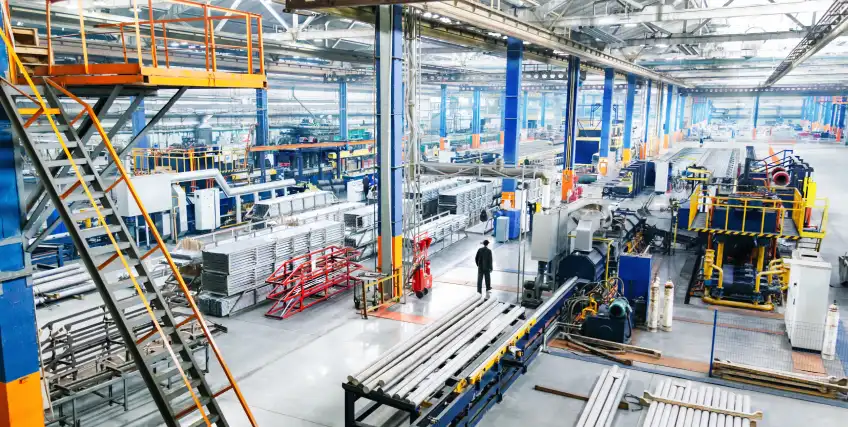Smart Financing Tips for Manufacturing Startups
July 04, 2025 | Last Updated on: July 07, 2025

Manufacturing is a very capital-intensive industry. Manufacturing companies have a wide range of business needs, from raw materials and labor to manufacturing equipment and factory space. The costs accumulate quickly, which is why a loan for manufacturing industry may be vital to your success.
Finding the right manufacturing business loans isn’t always easy, however, especially when you’re just starting out. Startups tend to struggle to get approved for financing by traditional banks and may have to explore alternative loan programs and financing options. Whether you need a loan for manufacturing industry to acquire new equipment, invest in real estate, or any other business need, we’ll help you explore your loan options and provide tips to get approved.
In this article:
Understand what’s needed to get approved for a loan for manufacturing industry.
Learn the manufacturing financing solutions available, from loans for manufacturing business to venture capital.
Explore alternatives to applying for loans to meet your business goals.
1. Understand Your Financing Needs
Before you look for outside capital, you have to know exactly how you’ll use a loan amount. You’ll need to be precise to improve your loan application chances. Before you apply, think through all of your various costs and do your best to estimate them as accurately as possible:
Startup Costs: Itemize the upfront costs for establishing the facility, including the purchase or lease of real estate (does the project require a loan for factory construction?), renovations, utility connections, and all initial legal and administrative fees.
Equipment Costs: Equipment purchases typically represent a substantial portion of manufacturing expenses. List every piece of necessary machinery for your production line, from CNC machines and assembly lines to testing apparatus and material handling equipment. Get multiple quotes from suppliers for these fixed assets, and account for installation costs and potential maintenance agreements. Equipment loans can help cover these costs using the equipment itself as collateral.
Working Capital: You need working capital for raw materials, labor costs, inventory, utilities, marketing efforts, and unforeseen expenses. Project how long you can sustain operations before you start generating revenue to get an idea of the amount and type of loan for manufacturing industry you need.
Financial Projections: Develop realistic financial forecasts for at least three to five years. These should include sales projections, cost of goods sold, operating expenses, and cash flow statements. Lenders require a clear demonstration of the path to profitability and the proposed repayment strategy for any manufacturing business loans.
Meticulously detailing these numbers strengthens a loan application and gives you a better idea of how to manage your company’s financial health.
2. Explore Many Types of Financing
The financing landscape has evolved beyond traditional bank loans. Today, there are a wide variety of small business loans for manufacturing industry and alternative financing solutions.
Traditional Loans
Conventional term loans are offered by both traditional banks and online lenders. Banks tend to have strict eligibility requirements that may make it difficult for startups to qualify for long-term financing, but if a business owner has a strong personal credit history, a robust business plan, and some existing assets for collateral, a traditional term loan can offer competitive interest rates and longer repayment periods. If not, online lenders tend to be more willing to work with startups, although they often have higher interest rates.
Small Business Administration (SBA) Loans
The SBA doesn’t directly lend but guarantees a portion of loans originated by approved lenders. This reduces risk for banks, making them more inclined to lend to small businesses, including manufacturing startups. Some of the best loans for manufacturing industry include:
SBA 7(a) Loans: These are highly versatile and can be utilized for nearly any legitimate business purpose, including working capital, equipment acquisition, and real estate. They offer favorable terms and lower down payments for qualified applicants.
SBA 504 Loans: The SBA 504 program is highly beneficial for businesses looking to purchase or construct real estate (an option for a loan for new manufacturing unit construction) or acquire heavy machinery. It provides long-term, fixed-rate financing, typically with lower down payments, which can be a critical advantage for capital-intensive ventures.
SBA loans can help manufacturing business owners who don’t qualify for conventional financing get the capital they need.
Equipment Financing
Given the necessity of equipment for supporting manufacturing firms’ supply chain and everyday operations, specialized equipment financing makes sense. Rather than securing a general business loan, you can use financing to purchase specific equipment. The equipment itself often serves as collateral, simplifying the qualification process and preserving working capital for other operational needs.
Asset-Based Lending (ABL)
ABL allows businesses to borrow against existing assets, such as accounts receivable (unpaid invoices) or inventory. As the business expands and accumulates more assets, its borrowing capacity can increase. This is particularly useful for managing cash flow fluctuations common in manufacturing, where customer payments may have extended terms, but you still need to pay suppliers and employees.
Lines of Credit
A business line of credit offers flexible financing that’s somewhere between a term loan and a business credit card. You get approved for a maximum amount and can draw funds as needed, only paying interest on the amount you use. This option is ideal for managing short-term working capital needs, unexpected expenses, or bridging gaps between large orders and payments.
Invoice Factoring/Financing
For manufacturing businesses with a substantial volume of outstanding invoices from creditworthy customers, invoice financing or factoring can provide immediate cash flow. Invoices are sold (or used as collateral) to a third party at a slight discount, who then collects payment from the customers. This offers a rapid method to unlock cash tied up in receivables, and it’s much easier to get than conventional loans for manufacturing industry.
Venture Capital and Angel Investors
Finally, if a manufacturing startup demonstrates high growth potential, a unique product, or disruptive technology, venture capitalists (VCs) and angel investors could be interested. These investors provide capital in exchange for equity (ownership stake) in the company. While they can offer substantial funding and valuable mentorship, they also anticipate a significant return on their investment and may influence business operations.
3. Develop a Robust Business Plan
Your business plan serves as a financing blueprint. It’s how you persuade lenders and potential investors to see and support your vision, and can be the difference between getting a loan denied or approved. A good business plan includes:
Executive Summary: A concise, engaging overview of the entire plan.
Company Description: Defines the business's purpose, the problem it solves, and its mission.
Market Analysis: Identifies target customers, competitors, and the business's competitive advantages. This section should clearly understand the market relevant to the loan for manufacturing industry request.
Organization & Management: Introduces key team members and highlights their relevant experience.
Product/Service Line: Details the manufactured product(s), their features, benefits, and any associated intellectual property.
Marketing & Sales Strategy: Outlines how customers will be reached and products sold.
Funding Request: Specifies the exact amount of capital needed, its intended use (e.g., specific equipment, raw materials, marketing), and the proposed repayment strategy.
Financial Projections: Includes the detailed forecasts previously mentioned.
A well-researched, clearly articulated business plan demonstrates professionalism, industry understanding, and a commitment to success.
4. Optimize Your Credit Profile
Your creditworthiness refers to how likely you are to repay a loan. Lenders typically evaluate both your personal credit scores (especially for startups that don’t have established business credit), and business credit scores, if applicable.
Before applying for a loan for manufacturing industry, make sure your personal credit score is in good shape. You may want to take some time to pay down balances before applying to ensure it’s in the best place possible or apply with a co-signer with a stronger score.
After establishing your business, it’s also a good idea to secure a DUNS number to start building business credit as you make timely payments to suppliers.
A strong credit profile shows financial responsibility and mitigates perceived risk for lenders, potentially leading to more favorable loan terms and lower interest rates on loans for manufacturing industry.
Be Realistic and Patient
Financing a manufacturing startup is a process, not an immediate outcome. It requires time to research options, prepare applications, and navigate the approval process. Be realistic about the amount of funding attainable and the terms offered, particularly in the initial stages. You may not get approved right away. Be patient and persistent to find the right financing solutions for your business.
Final Thoughts
Manufacturing initiatives can be very lucrative, but they’re also very expensive when you’re just starting out. Loans for manufacturing industry can help your business get off the ground, but it’s important to make sure you’re getting the right kind of capital to foster sustainable growth. A strong financial foundation can be established for a manufacturing startup to thrive by understanding your financial needs, exploring diverse options, and smart planning.
FAQs About Loans for Manufacturing Industry
1. Why do manufacturing startups struggle to get financing?
Manufacturing startups need a lot of upfront capital before they start to see a return on revenue. This often makes lenders see them as high-risk due to a limited operating history and potential cash flow volatility. If you have a poorly constructed business plan, insufficient collateral, or poor credit history, it can be hard to get funding?
2. Do I need to provide a personal guarantee for a loan for manufacturing industry?
A personal guarantee is often mandatory for many startup loans for manufacturing industry, particularly traditional bank loans and SBA loans. Basically, a personal guarantee says that you will become personally responsible for the loan if your business fails to pay it.
3. How much capital does a manufacturing startup need?
There’s no definite rule, but it’s generally advisable for any business to have enough capital to cover at least 3-6 months of operating expenses before applying for external financing. This shows a commitment to the business and provides a financial buffer while you’re starting out. Having invested personal capital tends to make a borrower more appealing to lenders.
4. What’s the difference between equipment leasing and loans?
With an equipment loan, you borrow the funds to purchase equipment outright. You make regular payments over a specified term, after which the equipment becomes wholly owned by the business. In contrast, equipment leasing involves renting the equipment for a defined period. You make lease payments, and at the end of the lease term, you may return the equipment, renew the lease, or purchase it for its residual value.
5. What is the typical timeframe for manufacturing loan approval and funding?
It depends on the loan type and the lender. Simpler financing options, such as a business line of credit or some forms of equipment financing, might be approved and funded within several days to a couple of weeks. More complex loans for manufacturing industry, such as SBA loans or real estate loans, may take months for the due diligence and underwriting processes.




